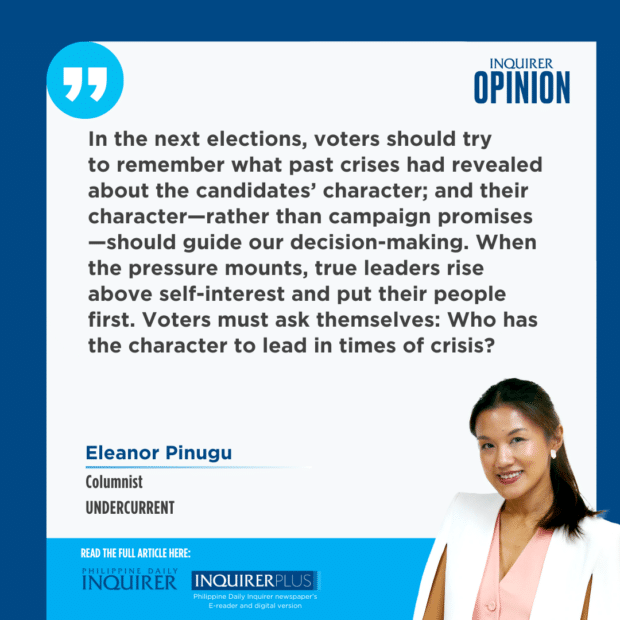How crises reveal character

It is often said that a person’s true character is not revealed on their best days but in their worst moments. Crises—whether they come in the form of a personal trial or a large-scale natural disaster—bring to light a person’s ability to navigate uncertainty and demonstrate how well their values hold under pressure.
In the aftermath of Severe Tropical Storm “Kristine,” we were able to observe two kinds of responses: one oriented toward personal survival and another toward collective well-being. We saw stories of people volunteering to join the rescue team even if it meant putting their own life at risk. In contrast, there were also news reports of small businesses in Naga that lost millions of pesos because of people who took advantage of the bad weather to loot their stores.
Researchers usually assess and categorize these behaviors within the selfish-selfless spectrum, with neurobiological studies increasingly indicating that our responses to challenging situations are largely shaped by past social experiences. Individuals who benefit from caring relationships and a strong support network are wired to believe in collective well-being. In turn, they are more inclined to act selflessly when faced with critical challenges, benefiting entire communities in times of crisis. This is supported by other research findings on how societies with higher levels of inclusion consistently have lower crime rates, higher civic engagement, and greater resilience in times of stress.
On the other hand, those with negative social experiences—particularly those involving inequality and isolation—are more likely to default to selfish behaviors, driven by a more self-centered neural response. For these individuals, the instinct for survival tends to override everything else. It is easy to recall how at the start of the pandemic-inducted lockdown, some people hoarded supplies even if they knew it meant that others would not have access to those essential goods. According to research, these are neural responses born out of past experiences of inequality, scarcity, and distrust. While the insight that social disparities breed discord is not new, this reinforces the importance of supporting long-term social sustainability initiatives that not only address immediate community needs but also build the foundation for lasting social cohesion.
Beyond individual actions, however, crises also offer a good opportunity to get to know the kind of leaders we have. High-pressure situations offer a lens through which we can assess a person’s ability to lead: How they manage adversity, respond to public needs, and whether they can put the collective good above personal or political gain.
Think of how the pandemic, given its severe impact on all aspects of life and society, highlighted how the crisis management abilities of political leaders directly determined a country’s capacity to endure and recover. It served as a global reminder that the kind of leaders we elect can have life-or-death consequences. Hopefully, it has heightened public awareness of the accountability and competence we should expect from our government officials.
In a crisis, leaders are not just expected to act quickly but to be able to consistently provide reliable support all throughout. Psychologists cite the importance of “holding”—a leader’s ability to offer reassurance and help others make sense of the challenges they are facing by providing clear directions and mobilizing them toward a common goal. Post-pandemic studies showed that empathy and collaboration, critical components of this skillset, enabled female leaders to manage the crisis more effectively in several cases than their male counterparts. In countries led by women, responses to COVID-19 were often more decisive and with a clear focus on protecting vulnerable populations.
Last week, former vice president Leni Robredo, whose office became quite known during her term for effective disaster response strategies, continued to show us what is possible even without holding an official government position. Robredo was able to swiftly mobilize trucks and pump boats for rescue, and raised over P7 million of monetary donations within 24 hours (it reached over P19 million after three days). While it may be unrealistic to expect every politician to wade through waist-deep floodwaters to deliver relief goods as she did, one wishes that Robredo’s proactive, empathetic, and efficient approach to crisis response becomes the standard, not the exception.
In the next elections, voters should try to remember what past crises had revealed about the candidates’ character; and their character—rather than campaign promises—should guide our decision-making. When the pressure mounts, true leaders rise above self-interest and put their people first. Voters must ask themselves: Who has the character to lead in times of crisis? Who can we trust to act with integrity, empathy, and accountability when it matters most? The answers to these questions should inform how we cast our ballots next May. Kristine was a somber reminder that the stakes are too high for us to choose otherwise.
—————-
eleanor@shetalksasia.com




















